新外研版七年级上册Module4重点短语句子
外研版七年级上册各单元重点单词短语句型
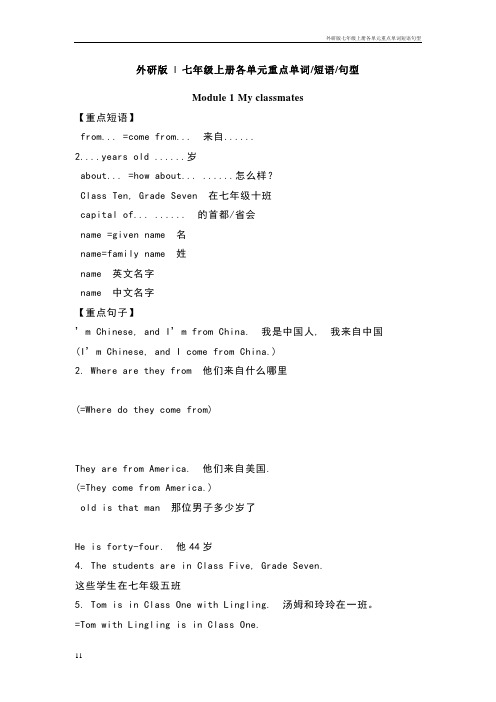
外研版| 七年级上册各单元重点单词/短语/句型Module 1 My classmates【重点短语】from... =come from... 来自......2....years old ......岁about... =how about... ......怎么样?Class Ten, Grade Seven 在七年级十班capital of... ...... 的首都/省会name =given name 名name=family name 姓name 英文名字name 中文名字【重点句子】’m Chinese,and I’m from China. 我是中国人, 我来自中国(I’m Chinese, and I come from China.)2. Where are they from 他们来自什么哪里(=Where do they come from)They are from America. 他们来自美国.(=They come from America.)old is that man 那位男子多少岁了He is forty-four. 他44岁4. The students are in Class Five, Grade Seven.这些学生在七年级五班5. Tom is in Class One with Lingling. 汤姆和玲玲在一班。
=Tom with Lingling is in Class One.=Tom and Lingling are in Class One.about you=How about you=And you你呢/你怎么样to Class 6 Grade 7 ! 欢迎到七年级六班。
8. Beijing is the capital of China. 北京是中国的首都。
to see you.=Nice to see you.=Glad to see you. 很高兴见到你。
外研版七年级英语上册Module4 Healthy food 知识点
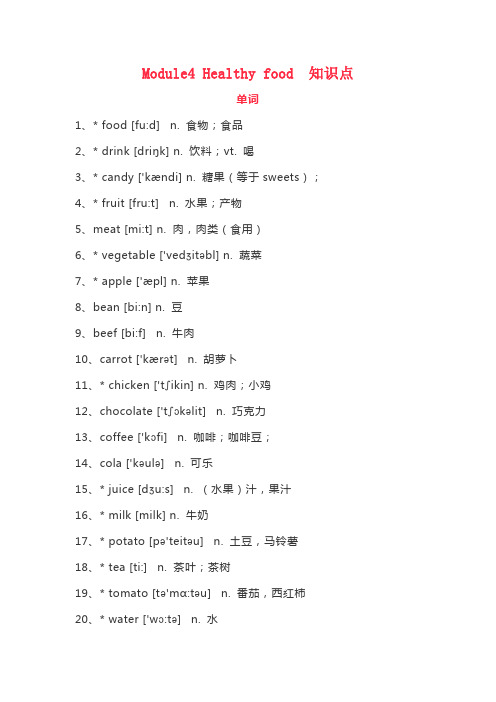
Module4 Healthy food 知识点单词1、* food [fu:d] n. 食物;食品2、* drink [driŋk] n. 饮料;vt. 喝3、* candy ['kændi] n. 糖果(等于sweets);4、* fruit [fru:t] n. 水果;产物5、meat [mi:t] n. 肉,肉类(食用)6、* vegetable ['vedʒitəbl] n. 蔬菜7、* apple ['æpl] n. 苹果8、bean [bi:n] n. 豆9、beef [bi:f] n. 牛肉10、carrot ['kærət] n. 胡萝卜11、* chicken ['tʃikin] n. 鸡肉;小鸡12、chocolate ['tʃɔkəlit] n. 巧克力13、coffee ['kɔfi] n. 咖啡;咖啡豆;14、cola ['kəulə] n. 可乐15、* juice [dʒu:s] n. (水果)汁,果汁16、* milk [milk] n. 牛奶17、* potato [pə'teitəu] n. 土豆,马铃薯18、* tea [ti:] n. 茶叶;茶树19、* tomato [tə'mɑ:təu] n. 番茄,西红柿20、* water ['wɔ:tə] n. 水21、* shop [ʃɔp] vi. 购物;买东西22、go shoping 去买东西,去购物23、* have [hæv, həv] aux. 助动词。
vt. 有,吃,喝24、* get [ɡet] vt. 得到;获得25、have got 有;拥有26、* some [sʌm] adj. 一些;若干;少量。
pron. 一些;某些27、* much [mʌtʃ] adj. 大量的,许多。
外研版七年级上册英语全书短语归纳
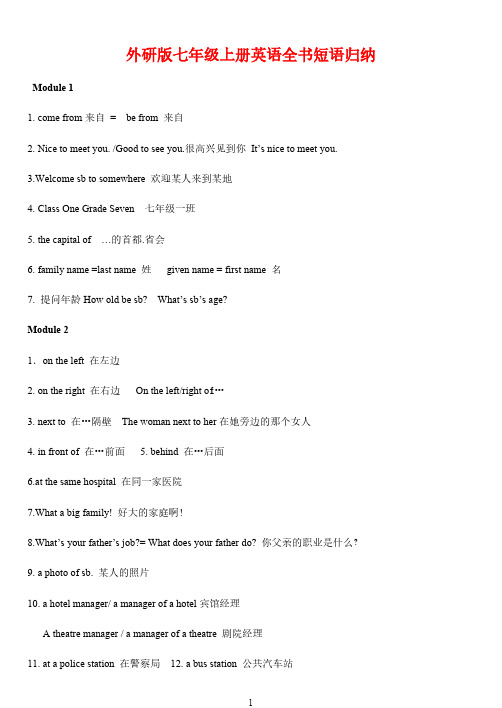
外研版七年级上册英语全书短语归纳Module 11. come from来自= be from 来自2. Nice to meet you. /Good to see you.很高兴见到你It’s nice to meet you.3.Welcome sb to somewhere 欢迎某人来到某地4. Class One Grade Seven 七年级一班5. the capital of …的首都.省会6. family name =last name 姓given name = first name 名7. 提问年龄How old be sb? What’s sb’s age?Module 21.on the left 在左边2. on the right 在右边On the left/right o f…3. next to 在…隔壁The woman next to her在她旁边的那个女人4. in front of 在…前面5. behind 在…后面6.at the same hospital 在同一家医院7.What a big family! 好大的家庭啊!8.What’s your father’s job?= What does your father do? 你父亲的职业是什么?9. a photo of sb. 某人的照片10. a hotel manager/ a manager of a hotel宾馆经理A theatre manager / a manager of a theatre 剧院经理11. at a police station 在警察局12. a bus station 公共汽车站13. a farm worker 一位农场工人14. family doctor 家庭医生15. family (集合用法)①视为“整体”谓语动词用单数②视为“每个家庭成员”谓语动词用复数。
外研版七年级英语上册Module 4模块知识点归纳

外研版七年级英语上册Module 4 Healthy foodWe've got lots of apples.必背单词1.candy (n.)糖果→candies (pl.)2.potato (n.)马铃薯,土豆→potatoes3.have (v.aux.)助动词(v.)有,吃、喝→has(第三人称单数形式) 4.kind (n.)种类→kinds (pl.)5.bad (adj.)坏的,不好的→good(反义词)好的6.food (n.)食物,食品7.drink (n.)饮料;(v.)喝8.fruit (n.)水果9.meat (n.)肉10.vegetable (n.)蔬菜11.apple (n.)苹果12.bean (n.)豆13.beef (n.)牛肉14.carrot (n.)胡萝卜15.chicken (n.)鸡肉16.chocolate (n.)巧克力17.coffee (n.)咖啡18.juice (n.)果汁19.milk (n.)牛奶20.tea (n.)茶21.water (n.)水22.shop (v.)逛商店;购物23.get (v.)得到24.some (adj.)若干,一些,少量的(pron.)一些,某些25.so (conj.)因此,所以必背短语26.go shopping去买东西,去购物27.have got有;拥有28.too much太多29.lots of大量;许多必背句子30.Let's get some chicken.我们买些鸡肉吧。
31.What kind of fruit?哪种水果?32.How about some orange juice?买些橘汁怎么样?33.Let's get some for your mum.我们给你妈妈买一些。
Is your food and drink healthy? 必背单词1.healthy (adj.)健康的→health (n.)健康2.child (n.)(14岁以下的)小孩;儿童→children (pl.)3.right (adj.)正确的,对的→wrong(反义词)4.tooth (n.)牙齿→teeth(pl.)5.tired (adj.)劳累的(主语为人)→tiring (adj.)令人劳累的(主语为物) 6.important (adj.)重要的→importance (n.)重要性7.well(adv.)好地→good (adj.)好的8.fat (adj.)肥胖的→thin(反义词)瘦的9.delicious (adj.)美味的10.bread (n.)面包11.fish (n.)鱼肉;鱼12.hamburger (n.)汉堡包13.noodle (n.)面条14.rice (n.) 米;米饭15.sugar (n.)糖16.eat (v.)吃17.sweet (adj.)甜的18.egg (n.)蛋,鸡蛋19.eye (n.)眼睛20.cheese (n.)奶酪21.soup (n.)汤22.remember (v.)记住;想起23.stay (v.)保持,停留24.or (conj.)或者25.breakfast (n.)早饭lunch(n.)午饭26.every (adj.)每个,每一27.home (n.)家,家庭必背短语28.ice cream冰激凌29.be good for对……有帮助30.be bad for对……有害31.a bit稍微,有点儿32.get fat发胖必背句子33.Is your food and drink healthy?你的饮食健康吗?34.It is important to remember:eat well, stay healthy, and don't get fat!记住这些很重要:吃得好,保持健康,不要太胖!35.Have a good breakfast every morning.每天早上吃一顿很好的早饭。
外研版 七年级上册Starter Module 4 知识点总结

Starter Module 4 知识点一.单词季节season 春spring 夏summer 秋autumn\fall 冬winter天气weather 暖和的warm 炎热的hot 凉爽的cool 寒冷的cold一天day 今天today 明天tomorrow 最喜欢的favourite 喜欢like生日birthday 星期一Monday 星期二Tuesday 星期三Wednesday星期四Thursday 星期五Friday 星期六Saturday 星期天Sunday运动sport 篮球basketball 足球football 乒乓球table tennis 游泳swimming 让let 我们(宾格) us 参加,玩耍play 想法,主意idea 中国Chinese 北京Peking 英国England 伦敦London二.词组在黑板上on the blackboard 在你的书上in your book放学后after school 在春天in spring 在夏天in summer 在秋天in autumn 在冬天in winter 打篮球play basketball 踢足球play football 打乒乓球play table tennis去游泳go swimming 我最喜欢的运动my favourite sport你最喜欢的运动your favourite sport 他最喜欢的运动his favourite sport她最喜欢的运动her favourite sport 好主意good idea 在周一on Monday 在周日on Sunday 今天早上this morning 今天下午this afternoon三.句子1.今天是星期几?今天是周二。
What day is it today? It’s Tuesday.2.明天是星期几?明天是周三。
What day is it tomorrow? Tomorrow is Wednesday.3.今天是星期四,明天是星期五。
七年级英语上册 starter4个模块重点句型归纳总结 外研版

月考复习资料(Module1~~~Module4)I Greetings (基本问候语)1.Hello/ Hi 你好 2. Good morning/ afternoon/ evening 早上/下午/晚上好3.———How do you do?你好!(第一次见面时)———How do you do?你好!4.———How are you?(你好吗?)———I’m fine./ I’m OK/ I’m very well./ Just so—so(一般般). And you? ———I’m fine, too(也). Thank you.5.———Nice to meet you!(见到你很高兴!)———Nice to meet you,too!(见到你我也很高兴!)II 重点句型1.What’syourname, please? (请问你叫什么名字?)什么是你的名字请2.My name is ……/ I’m …(我的名字是。
/我是。
)我的名字是我是3.This is ……(这位是。
)这位/个是4.———What’s this in English?(这用英语怎么说/ 这是什么?)什么是这个用英语———It’s a book.(它是一本书)它是一本书5.———What are these?(这些是什么?)什么是这些———They are books./ These are books.(他们是书/ 这些是书)他们是书这些是书6.———How many desks are there?(有多少X桌子?)多少桌子有---------There areten desks.(有十X桌子)/ There is (only) one desk./(仅仅只有一X桌子)有十(X)桌子有仅仅一(X)桌子There is no desk. (没有桌子)有不桌子What colour is the tree?(这棵树是什么颜色的?)什么颜色是这(棵)树-------I t’s green.(它是绿色的)它是绿色------- What colour are the flowers?(这些花是什么颜色的?)什么颜色是这(些)花------- They’re blue.(他们是蓝色的)它们是蓝色8.------ How do you spell “blue”?(怎样拼写“blue”)怎样你拼写蓝色Where’s my/the coat?(我的/这件外套在哪儿?)哪儿是我的/这(件)外套------ It’s on the bed.(它在这X床上)它是在。
英语七年级上册重点句型整理外研版

七年级上册重点句型整理(外研版)Module1 My classmates【重点句型】1. I’m Chinese, and I’m from China. =I’m Chinese, and I come from China.) 我是中国人, 我来自中国.2. ---Where are they from? =Where do they come from? 他们来自什么哪里?---They are from America.=They come from America.) 他们来自美国.3. ---How old is that man? 那位男子多少岁了?---He is forty-four. 他44岁.4. The students are in Class Five, Grade Seven. 这些学生在七年级五班.5. Tom is in Class One with Lingling.=Tom with Lingling is in Class One.=Tom and Lingling are in Class One. 汤姆与玲玲在一班.6. What about you?=How about you?=And you? 你呢?/你怎么样?7. Welcome to Class 6 Grade 7! 欢迎来到七年级六班。
8. Beijing is the capital of China. 北京是中国的首都。
9. Good to see you.=Nice to see you.=Glad to see you. 很高兴见到你。
10. I’m Tony Smith. Tony is my first name and Smith is my last name. 我是Tony Smith,Tony是我的名,Smith 是我的姓。
Module2 My family【重点句型】1. This is a photo of Tony' s family. 这是Tony的一张全家福。
最新外研版七年级英语(上册)词组归纳
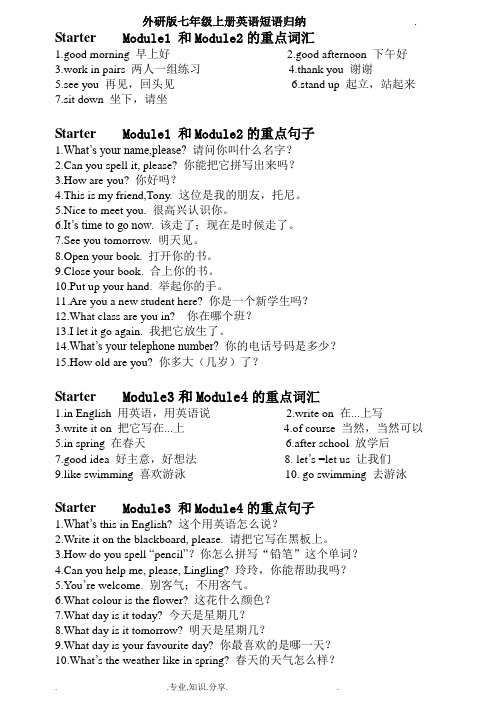
Starter Module1 和Module2的重点词汇1.good morning 早上好2.good afternoon 下午好3.work in pairs 两人一组练习4.thank you 谢谢5.see you 再见,回头见6.stand up 起立,站起来7.sit down 坐下,请坐Starter Module1 和Module2的重点句子1.What’s your name,please? 请问你叫什么名字?2.Can you spell it, please? 你能把它拼写出来吗?3.How are you? 你好吗?4.This is my friend,Tony. 这位是我的朋友,托尼。
5.Nice to meet you. 很高兴认识你。
6.It’s time to go now. 该走了;现在是时候走了。
7.See you tomorrow. 明天见。
8.Open your book. 打开你的书。
9.Close your book. 合上你的书。
10.Put up your hand. 举起你的手。
11.Are you a new student here? 你是一个新学生吗?12.What class are you in? 你在哪个班?13.I let it go again. 我把它放生了。
14.What’s your telephone number? 你的电话号码是多少?15.How old are you? 你多大(几岁)了?Starter Module3和Module4的重点词汇1.in English 用英语,用英语说2.write on 在...上写3.write it on 把它写在...上4.of course 当然,当然可以5.in spring 在春天6.after school 放学后7.good idea 好主意,好想法8. let’s =let us 让我们9.like swimming 喜欢游泳10. go swimming 去游泳Starter Module3 和Module4的重点句子1.What’s this in English? 这个用英语怎么说?2.Write it on the blackboard, please. 请把它写在黑板上。
七年级上册Module4Healthyfood外研版七年级英语上册M

外研版新标准英语七年级上Module 4 Healthy foodUnit 1 We've gotlots of apples教学课型:Listening and Speaking教材分析本模块是外研版七年级上册第四模块,以“Healthy fbod”为话题,针对中学生挑食,吃零食的现象,重点介绍了健康食品。
本话题与学生的生活实际紧密相关,因而七年级学生对此很感兴趣,同时也增加了他们对健康食品的了解,有助于培养其健康的饮食习惯。
本节课是第一单元,侧重培养学生的听说能力,对话语境是托尼和爸爸谈论家里有什么食物及还需购买什么食物,自然引出语法项目“have/have got…”句型,要求学生能用“have/have got…”结构谈论购买什么食物,同时引入“健康食物”的概念。
学情分析本单元的主题是谈论水果、蔬菜和饮料方面的购物计划,围绕这一主题进行一系列的交际活动, 本课的学习主体是初一学生,他们好奇心强,乐于表达,有较强的模仿能力和求知欲,并具备了简单的英语口语交际的能力,他们对于蔬菜和水果单词的学习应该不成问题。
但是由于课堂时间有限,学生对have/has got句型的肯定句,否定句和疑问句的运用可能不够熟练,需要更多时间操练,因此本人在教学中设置了小组合作学习,针对不同层次学生的学习,安排可选择的难易活动和题目,以提高综合运用语言能力,使各个层次的学生都有所收获。
教学目标1 .知识与技能目标1)功能谈论健康食品2)词汇理解并掌握本单元中的下列单词(准确发音、拼写、掌握词性、理解词义、并能真实运用)。
名词(214、):food, drink, candy, fruit, meat, vegetable, apple, bean, beef, carrot, chicken, chocolate, coffee, cola, juice, milk, potato, tea, tomato, water, kind形容词(4 个):some, any, much, bad动词(4 个):drink, shop, have, has短语(6 个):go shopping fbr, too much. How about...? lots of, be good/bad fbr, all right3)语法掌握“have/hasgot…”句型的肯定句、否定句、一般疑问句及其回答;能在句子中正确使用“some” 和“any”;能区分可数名词和不可数名词4)语音正确朗读[s] [z] [t] [d]5)能听懂关于食物和饮料的对话;能通过语调识别出句式。
七年级英语上册 Module 4 Healthy food词句精讲精练 (新版)外研版

Module 4 Healthy food词句精讲精练词汇精讲1. foodfood泛指“食物”,“食品”,通常用做不可数名词。
例如:I like Chinese food. 我喜欢中国食品。
We should eat healthy food every day. 我们每天应该吃健康食品。
food指食物的种类时是可数名词。
例如:Milk is a good food. 牛奶是一种好食品。
Too many sweet foods, like cakes and pastry, may make you fat. 太多的甜食,像蛋糕和点心,可能会使你发胖。
2. fruitfruit 名词,“水果”。
当表示水果的总称时,是不可数名词;当强调不同种类的水果时,是可数名词。
例如:Do you like fruit? 你喜欢水果吗?Which kind of fruit do you like? 你喜欢哪一种水果。
3. chickenchicken名词,意为“鸡肉,小鸡”。
表示“鸡肉”时为不可数名词;表示“小鸡”时则为可数名词,其复数形式是chickens。
如:Chicken is healthy food. I like eating it. 鸡肉是健康食品,我喜欢吃。
We can see some chickens on the farm. 在农场上我们可以看见一些小鸡。
4. kindkind 作名词时,意为“种类”;a kind of 意为“一种”;all kinds of 意为“各种各样的”。
都表示种类,用来修饰名词。
例如:This is a kind of bird. 这是一种鸟。
There are all kinds of birds in the tree. 树上有各种各样的鸟。
5. lots oflots of的意思是“大量的、许多的”,和a lot of是同义词短语。
lots of既可以修饰可数名词的复数形式,相当于many;也可以修饰不可数名词,相当于much。
七年级英语上册 Module 4《My family》精练精析 外研版
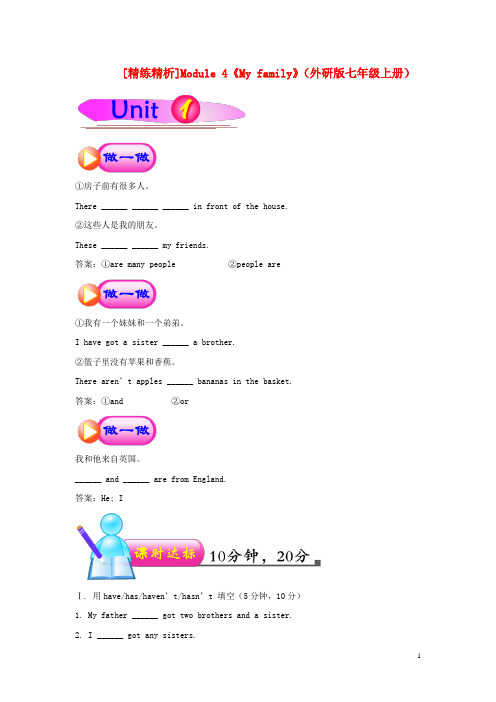
[精练精析]Module 4《My family》(外研版七年级上册)①房子前有很多人。
There ______ ______ ______ in front of the house.②这些人是我的朋友。
These ______ ______ my friends.答案:①are many people ②people are①我有一个妹妹和一个弟弟。
I have got a sister ______ a brother.②篮子里没有苹果和香蕉。
There aren’t apples ______ bananas in the basket.答案:①and ②or我和他来自英国。
______ and ______ are from England.答案:He; IⅠ. 用have/has/haven’t/hasn’t 填空(5分钟,10分)1. My father ______ got two brothers and a sister.2. I ______ got any sisters.3. —______ you got a happy family? —Yes, I ______ .答案:1. has 2. haven’t 3. Have; have4. — ______ he got a little brother?—No, he ______ .5. My mum ______ got any uncles or aunts.答案:4. Has; hasn’t 5. hasn’tⅡ. 用所给词的适当形式填空(5分钟,10分)1. Are they your ______ (brother)?2. There are three people in ______ (Tom) family.3. ______ (they) names are Linda and Jim.4. Kate ______ (have) got a grandmother.5. The old man and the old woman are my ______ (grandparent).答案:1. brothers 2. Tom’s 3. Their 4. has 5. grandparents句型展示台1. 你有一个小家庭还是一个大家庭?______ you got a small family ______ a big family?2. 我有一个小家庭。
外研版英语七年级上册 Module 4 知识点+习题
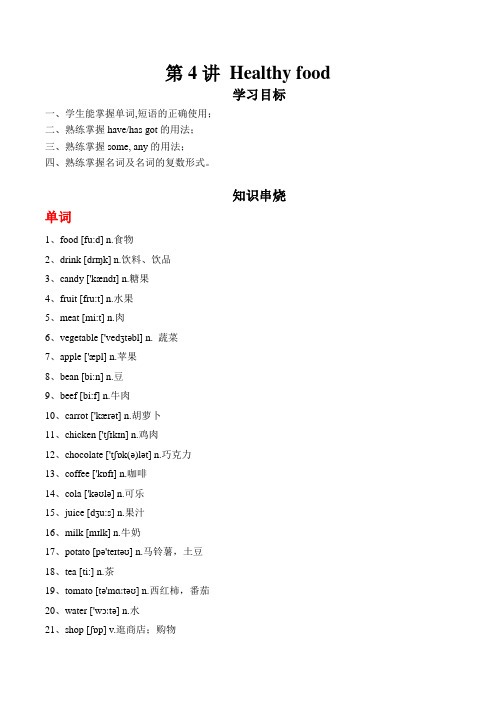
第4讲Healthy food学习目标一、学生能掌握单词,短语的正确使用;二、熟练掌握have/has got的用法;三、熟练掌握some, any的用法;四、熟练掌握名词及名词的复数形式。
知识串烧单词1、food [fu:d] n.食物2、drink [drɪŋk] n.饮料、饮品3、candy ['kændɪ] n.糖果4、fruit [fru:t] n.水果5、meat [mi:t] n.肉6、vegetable ['vedʒtəbl] n. 蔬菜7、apple ['æpl] n.苹果8、bean [bi:n] n.豆9、beef [bi:f] n.牛肉10、carrot ['kærət] n.胡萝卜11、chicken ['tʃɪkɪn] n.鸡肉12、chocolate ['tʃɒk(ə)lət] n.巧克力13、coffee ['kɒfɪ] n.咖啡14、cola ['kəʊlə] n.可乐15、juice [dʒu:s] n.果汁16、milk [mɪlk] n.牛奶17、potato [pə'teɪtəʊ] n.马铃薯,土豆18、tea [ti:] n.茶19、tomato [tə'mɑːtəʊ] n.西红柿,番茄20、water ['wɔːtə] n.水21、shop [ʃɒp] v.逛商店;购物22、go shopping 去买东西,去购物23、have [hæv] v. aux(助动词)有;吃,喝24、get [get] v.得到25、have got 有;拥有26、some [sʌm; s(ə)m] adj.若干,一些;少量的一些,某些27、much [mʌtʃ] adj.许多的,大量的28、too much 太多29、kind [kaɪnd] n.种类30、lots of 大量;许多31、so [səʊ] conj.因此;所以32、how about (征求意见)…好么?…行吗?33、has [hæz] (have的第三人称单数现在式)34、bad [bæd] adj.坏的;不好的35、healthy ['helθɪ] adj.健康的36、delicious [dɪ'lɪʃəs] adj.美味的37、bread [bred] n.面包38、fish [fɪʃ] n.鱼肉;鱼39、hamburger ['hæmbɜːgə] n.汉堡包40、ice cream [,aɪs'kri:m] n.冰激凌41、noodle ['nuːd(ə)l] n.面条42、rice [raɪs] n.米;米饭43、sugar ['ʃʊgə] n.糖44、children ['tʃɪldrən] n.(14岁以下的)小孩,儿童45、be good for 对…有帮助46、sweet [swiːt] adj.甜的47、be bad for 对…有害的48、right [raɪt] adj.正确的,对的49、egg [eg] n.蛋,鸡蛋50、eye [aɪ] n.眼睛51、cheese [tʃi:z] n.奶酪52、tooth [tu:θ](pl. teeth[ti:θ])n.牙齿53、bit [bɪt] n.一点;少许54、a bit 稍微;有点儿55、tired [taɪəd] adj.劳累的56、soup [su:p] n.汤57、important [ɪm'pɔːt(ə)nt] adj.重要的58、remember [rɪ'membə] v.记住;记起59、well [wel] adv.好地60、stay [steɪ] v.保持;停留61、fat [fæt] adj.肥胖的62、get fat 发胖63、or [ɔː] conj.或者64、breakfast ['brekfəst] n.早饭65、lunch [lʌntʃ] n.午饭66、home [həʊm] n.家;家庭67、dinner ['dɪnə] n.晚饭;正餐68、banana [bə'nɑːnə] n.香蕉69、buy [baɪ] v.买课文U1 We've got lots of apples.Tony’s dad: Tony, let's go shopping for food and drink. Now, we haven't got any meat. Let's get some chicken.Tony: OK. Have we got any chocolate?Tony’s dad: Yes, we have. Too much chocolate isn't good for you. Let's get some fruit.Tony: What kind of fruit? Apples?Tony’s dad: No, we've got lots of apples. We haven't got any oranges, so let's get some.Tony: OK. How about some orange juice?Tony’s dad: Yes, good idea! And coffee. Let's get some for your mum. She hasn't got any coffee. Tony: All right, some coffee for Mum, and some cola for me. I haven't got any cola.Tony’s dad: No cola! Cola is bad for you! How about some tea?Tony: Oh, too bad!U2 Is your food and drink healthy?Healthy food and drink for childrenIs your food and drink healthy? A lot of ice cream, hamburgers and cola is not healthy. Meat is healthy but too much meat is not good for children. Cola and candy are very sweet, and too much sugar is bad for you.Eat the right food and be healthy. Carrots, eggs and sweet potatoes are good for your eyes. Milk, cheese and fish are good for your teeth. A bit tired? Have lots of delicious chicken soup! It is important to remember: eat well, stay healthy, and don't get fat!·Eat noodles or rice, not hamburgers.·Have a good breakfast every morning.·Drink juice, water and milk, not cola.·Eat lots of fruit and vegetables.语法一、have/has got 的用法1. have got意为“有;拥有”,如果想表达某人拥有某物,可用句型“主语+have/has got+其他”,其中have有人称和数的变化,当句子主语为第三人称单数或单数名词时,用has got。
Module 4have got句型和名词的数(重点语法提升练)(外研版)

2023-2024学年七年级英语上册单元模块满分必刷题(外研版)Module 4 Healthy food【刷语法】(重点语法提升练)have got句型和名词的数一、have got句型用法:have got在句子中作谓语,随着句子主语的变化而变化。
主语是第三人称单数he,she或it 时用has got其余人称I, we,you或they用have got肯定句:某人+have/has got+其他She has got a new coat.她有一件新外套。
They have got some new computers.他们有一些新电脑。
否定句:在have/has 后直接加notHe hasn't got a new coat.他没有一件新外套。
They haven‘t got any new computers.他们没有新电脑。
一般疑问句:Have/Has+某人+got+其他?肯定回答:Yes,主语+have / has.否定回答:No,主语+haven't / hasn’t.Mary has got some meat.—Has Mary got any meat? — /—Have Mary and Tom got a new computer?—Yes, they have. No, they haven’t.注意:have/has got 表示所属关系,意为拥有,主语是人或机构、组织等;there be句型表示存在,即某地存在某物或某人,主语是be动词后的名词或代词。
/二、名词的数可数名词变复数1.规则变化2.例外情况1)以ch 结尾加s 的英语单词:stomach—stomachs2)以f 结尾直接加s 的英语单词:roof—roofs gulf—gulfs belief—beliefs staff—staffs chief—chiefs proof—proofs3)以f 结尾两种变法都可的单词:scarf—scarfs / scarves dwarf—dwarfs / dwarveshandkerchief—handkerchiefs / handkerchieves3.不规则变化1)单复数相同sheep deer fish2)a 变成e man woman Englishman Frenchman3)oo 变成ee foot tooth goose4)中日不变英法变,其余s 加后边;German德国人,其复数形式为Germans5)特殊变化child—children ox — oxen mouse—mice4.三个注意1.英语中一些由两个部分组成的物体名词通常是以-s 结尾,如:pants,trousers,shorts,shoes,scissors,glasses 等。
七年级上册英语外研版重点句子

七年级上册英语外研版重点句子以下是七年级上册英语外研版的一些重点句子:1、-What's your name? -My name's ...(询问别人叫什么名字)2、-How are you? -I'm fine./I'm OK.(问候别人)3、-Nice to meet you. -Nice to meet you, too.(遇见认识的人)4、-Where are you from? -I'm from ...(询问别人来自哪里)5、-What's your favorite subject? -My favorite subject is ...(询问别人最喜欢的科目)6、-What's your favorite color? -My favorite color is ...(询问别人最喜欢的颜色)7、-What's your favorite food? -My favorite food is ...(询问别人最喜欢的食物)8、-Can you speak English? -Yes, I can./No, I can't.(询问别人是否会讲英语)9、-What day is it today? -It's ...(询问今天是星期几)10、-What's the date today? -It's ...(询问今天是几号)11、-How much is it? -It's ... yuan.(询问物品价格)12、-What time is it? -It's ... o'clock.(询问现在几点)13、-What day is it? -It's ... day.(询问今天是星期几)14、-How are you doing?(问候别人近况)15、-Please sit down./Have a seat.(请别人坐下)16、-Thank you./Thanks a lot.(感谢别人)17、-You are welcome./Not at all.(回答别人的感谢)18、-What day is it today? -It's Monday./It's a sunny day.等等。
- 1、下载文档前请自行甄别文档内容的完整性,平台不提供额外的编辑、内容补充、找答案等附加服务。
- 2、"仅部分预览"的文档,不可在线预览部分如存在完整性等问题,可反馈申请退款(可完整预览的文档不适用该条件!)。
- 3、如文档侵犯您的权益,请联系客服反馈,我们会尽快为您处理(人工客服工作时间:9:00-18:30)。
• II.重点句子:
1.We’ve got lots of apples. 我们有大量的苹果。 2.He hasn’t got any meat. 他没有一些肉。 3.Have you got any chocolate? 你们有一些巧克力吗? Yes, we have. / No, we haven’t. 是的,我们有。/不,我们没有。 4.Let’s go shopping for food and drink. 让我们去买一些食品饮料吧。 5.Let’s get some coffee for your mum. 让我们给你妈妈买点咖啡吧。 6.Too much chocolate isn’t good for you. 太多的巧克力对你不好。
• 9.what kind of... 什么种类的...... • 10.one’s favourite food and drink 某人最喜欢的食品饮料 • 11.chicken soup 鸡汤 • 12.stay healthy 保持健康 • 13.eat well 吃好 • 14.have a good breakfast 吃一顿营养早餐 • 15.have sth for breakfast 早餐吃...... • 16.remember to do sth • 17.a bit tired 记得做...... 有一点儿累
Module 4 重点短语句子
I.重点短语:
• 1.have/has got... 有...... • 2.healthy food and drink 健康的饮品和饮料 unhealthy food and drink 健康的饮品和饮料 • 3.go shopping for sth. =go to buy sth 去 买...... • 4.too much +不可数; too many+可数 太多....... • 5.be good for... 对......有好处 • 6.be bad for 对......有害处 • 7.lots of...= a lot of...=many/much 大量的......;许多...... • 8.get sth for sb=buy sth for sb 为某人买......
7.What kind of fruit ?
什么种类的水果?
8.Cola is bad for you.
9.How about some orange juice? Good idea.
可乐对你有害。
一些橘汁怎么样? 好主意。
10.Is your food and drink healthy? 你的饮食健康吗? 11.It is important to stay healthy. 保持健康很重要。 12.There are lots of fruit and vegetables for lunch, but there isn’t any cola or candy. 中午有许多水果蔬菜,但没有可乐和糖果。 13.Please remember to buy some fruit.
14.I’m a bit tired.
请记得买一些水果。 我有一点儿累。
• III.基本语法点: • 1. have/has got 的含义及句子结构。 注意 there be的区别,以及和have/has的替换。 • 2.可数名词和不可数名词 • 3. some 和any的用法
